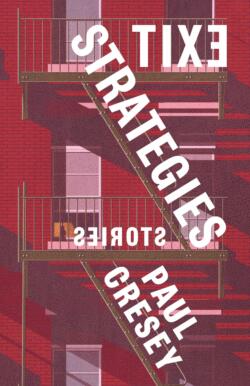1895 A ‘foreshock’ of a literary debut
Exit Strategies
By Paul Cresey
Calgary, AB: Freehand Books, 2023
$22.95 / 9781990601316
Reviewed by Zoe McKenna
*
 Paul Cresey’s Exit Strategies is the type of debut that arrives like a foreshock—a book that shakes things up just enough to know that something big is just around the corner.
Paul Cresey’s Exit Strategies is the type of debut that arrives like a foreshock—a book that shakes things up just enough to know that something big is just around the corner.
Exit Strategies collects 18 stories focused on escape. Whether physical, mental, emotional, or fantastical, each of Cresey’s protagonists arrive at the page actively seeking a way back off of it. Despite this dire setup, Exit Strategies is not nearly as morbid as it sounds. While every story is about leaving in one form or another, not all are about losing. Certainly, some of the stories are desperately sad (an elderly couple entwined in a suicide pact so as to have one last dance together). Yet others are violent (a prisoner who becomes sexually infatuated with another inmate’s fiancé) or even downright bizarre (a headless raccoon and a probable werewolf on a lonely island). With these tableaus, Victoria, BC-based Cresey sidesteps the predictable and offers a collection that is deeply compassionate at every turn.
All 18 pieces zero in on a decision point. These decisions, whether rooted in love, fear, lust, or otherwise, are necessarily intimate. Cresey approaches the stories in a way that is equal parts voyeuristic and tender. Each story is a peek behind the curtain of the characters’ lives in a way that feels intrusive. The author doesn’t shy away from this overstep; none of the characters are free from scrutiny under the looking glass.
Despite the clear thematic throughline, all the stories in Exit Strategies are starkly distinct. No two stories bleed together, because no two characters even verge towards likeness. The stories’ protagonists range from elderly convenience store owners, to an alien enthusiast, to a black market aficionado. Each is presented alongside a deftly woven backstory for readers to unveil in a matter of mere pages; and each story closes just at the precipice of all questions being answered. While not all characters are lovable, each highlights a rare understanding of the many disparate circumstances that create in people the burning itch to run and to escape.

Clarity and intricacy are not reserved for characters. Every location in the collection buzzes with the undercurrent of lively community. Even those more desolate locations—such as a remote island or a parabolic forest—are described in such a way that no stone is left unturned. A once touring singer-songwriter, Cresey describes locations with both the fresh eyes of a visitor and the attention of someone who has known a place for a lifetime. In some instances this scene-setting is fleeting, with just a few words to paint a picture. Elsewhere, Cresey meanders through description with an emphasis on minutiae, not efficiency.
Most notable is a multi-page description of a trek across southern Vancouver Island in “#8 The Interstellar Voyage of Granger Taylor.” The protagonist of the tale arrives in Victoria and drives over the Malahat, briefly stopping at a Tim Hortons before touring the BC Discovery Centre on the way to Mount Prevost. For those unfamiliar with the area, this tour paints a crystalline picture to the extent that one might be able to replicate the trip using only this story as a guide.
It is in these instances of hyper-realism that the boundaries between fiction and truth become muddy. In “#8 The Interstellar Voyage of Granger Taylor,” the protagonists traces the journey of Taylor, a real alien enthusiast who worked as a mechanic in Duncan, BC, before going missing in 1980 after he left a note to his parents that he was embarking on a 42-month galactic trip. Taylor, and his disappearance, are real. We’ll never know whether or not the events of Cresey’s eighth story are, too.
Other stories in the collection follow a first-person “I” narrator who further dilutes any certainty that this is a work exclusively of fiction. The final instalment, “The Afterword,” comes from this first-person narrator, who was born in 1985 and lives into his eighties through various, dubious means. This narrator details writing stories that appear in Exit Strategies, but bemoans never completing the collection. Cresey dabbles with space, time, and character in a way that is pleasantly confusing and charmingly earnest.
Perhaps most impressively, Exit Strategies is not a collection that presumes to have a solution. Cresey’s stories do not draw together at the close to form a concluding lesson, or even to offer moral judgment on the ethics of an ‘exit strategy.’ Through the strangeness, melancholy, and anger that permeate his collection, Cresey reminds us that, in Alexander Pope’s words, “to err is human.” Or, in Billy Ocean’s, “when the going gets tough, the tough get going.”
*

Zoe McKenna recently completed her Master of Arts from the University of Victoria and also holds a Bachelor of Arts from Vancouver Island University. Her thesis, as well as a great deal of her other reading and writing, focuses on horror writing in Canada, especially that by BIPOC authors. Her previous work has appeared in VIU’s Portal Magazine and the Quill & Quire. When not reading, writing, or reviewing, Zoe can be found hiking a local mountain or in front of a movie with her two cats, Florence and Delilah. She is always covered in cat hair and wears almost exclusively dark clothing to prove it. Find her on Twitter. Editor’s note: Zoe McKenna has recently reviewed books by Michelle Min Sterling, Eve Lazarus, David Wallace, David Ly & Daniel Zomparelli, Sophie Sullivan, kc dyer, Robyn Harding, and Lindsay Cameron for The British Columbia Review.
*
The British Columbia Review
Interim Editors, 2023-24: Trevor Marc Hughes (non-fiction), Brett Josef Grubisic (fiction)
Publisher: Richard Mackie
Formerly The Ormsby Review, The British Columbia Review is an on-line book review and journal service for BC writers and readers. The Advisory Board now consists of Jean Barman, Wade Davis, Robin Fisher, Barry Gough, Hugh Johnston, Kathy Mezei, Patricia Roy, Maria Tippett, and Graeme Wynn. Provincial Government Patron (since September 2018): Creative BC. Honorary Patron: Yosef Wosk. Scholarly Patron: SFU Graduate Liberal Studies. The British Columbia Review was founded in 2016 by Richard Mackie and Alan Twigg.
“Only connect.” – E.M. Forster
8 comments on “1895 A ‘foreshock’ of a literary debut”